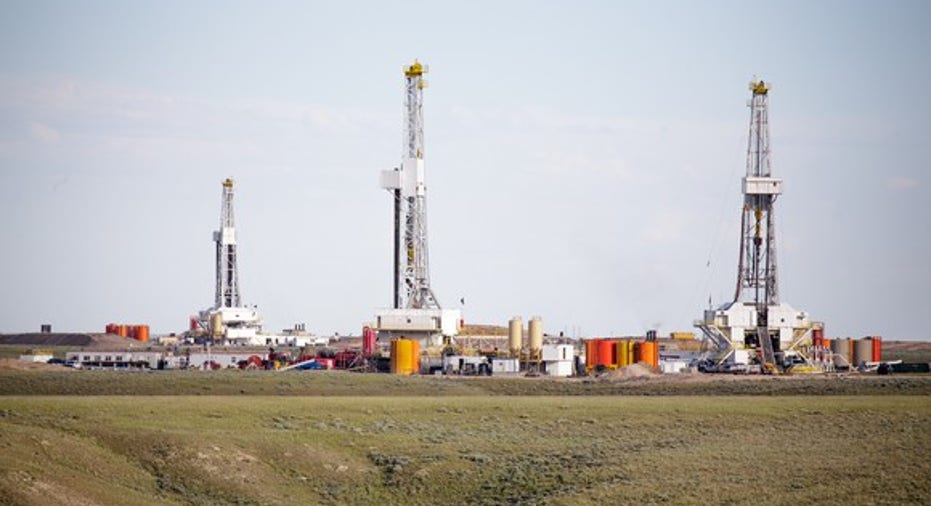4 Key Themes in the Oil Market Halliburton's Management Thinks You Should Know

For a couple of quarters in a row, Halliburton(NYSE: HAL) has been touting the strength of America's shale boom and how the company is the best positioned to produce high rates of return from that market over time. Its most recent quarterly conference call touched on a lot of similar themes as well as some of the other trends happening in the oil services industry today.
Here are four quotes from it that should help give investors an idea of how management is attacking the market today and how it plans to stay ahead of its competitors.
Image source: Getty Images.
North American activity going strong
When it comes to the North American drilling market, no one is more in tune with the situation on the ground than Halliburton. The company has a such a dominant market share that its largest rivals are combining forces to be more competitive in the shale drilling and fracking business. So if you want to know what's going on in North America, you need to listen to what Halliburton COO Jeff Miller has to say on conference calls. Here's what he said most recently about North American drilling:
These past two quarters have been challenging for Halliburton's earnings because it has had to spend a lot of money getting idle assets in working condition and rehiring crews. Management even warned of a weak quarter because of these costs, but this is a good problem to have.
The international market remains in neutral
For all the positive things we have seen in the North American market lately, Miller reminded those on the conference call that the entire oil and gas market isn't all rainbows and unicorns right now. Almost every market outside North America is struggling under the weight of low oil prices.
This trend is likely going to hurt the bottom line of competitors more than Halliburton's. Schlumberger(NYSE: SLB) and Baker Hughes(NYSE: BHI), for example, rely much more on either international markets or the U.S. Gulf of Mexico, which as of late has more in common with the global market than North America.
Eventually, more money will flow back into the offshore markets because shale in the U.S. alone won't be able to keep up with increasing demand and the natural decline of currently producing reservoirs around the world. From an investor's standpoint, though, this market is the embodiment of that famous John Maynard Keynes quote: "The market can stay irrational longer than you can stay solvent."
Taking a shot at the competition
One emerging trend among the big oil services companies has been combiningequipment manufacturing with services to create integrated solutions. Schlumberger did it when it bought subsea equipment manufacturer Cameron International and Baker Hughes' pending deal with General Electric's oil and gas division will accomplish similar things.
The risk with these high-profile mergers is the possibility that they won't necessarily pan out, which would equate to an inefficient allocation of capital. Miller took a couple of potshots at the competition this past quarter, saying that Halliburton didn't need to make a similar move to achieve the same things as its competitors.
Integration time?
In conjunction with the boom in shale drilling, demand for frack sand has skyrocketed recently. Frack sand suppliers are reporting sequential increases in volumes soldin the 20%-40% range for the past couple of quarters. Halliburton is one of the largest sand buyers out there, and some analysts were wondering if management was considering acquiring some frack sand production of its own to control logistics and ensure supply for customers. According to Miller, that isn't necessary at this point:
The boom and bust nature of commodity pricesis the exact opposite kind of business Halliburton wants to become today. So it doesn't make a whole lot of sense to add sand production to its portfolio. Sand transportation and logistics, on the other hand, is a valuable service to ensure on-time deliveries and to get a fixed price fee. Investors shouldn't completely rule out a competitor buying sand production, though, because it could be a way to distinguish its service from Halliburton's.
What a Fool believes
The oil services industry is at a fascinating crossroads today. Companies are trying to cut costs, offer integrated equipment and service packages, and fight for market share at the same time. Halliburton has an advantage because of its overwhelming market share in North America. The most pressing question for its investors in the coming quarters will be whether its competitors can claw away at its market share with these consolidation efforts. Based on management's statements, it doesn't seem too worried about that just yet.
10 stocks we like better than HalliburtonWhen investing geniuses David and Tom Gardner have a stock tip, it can pay to listen. After all, the newsletter they have run for over a decade, Motley Fool Stock Advisor, has tripled the market.*
David and Tom just revealed what they believe are the 10 best stocks for investors to buy right now... and Halliburton wasn't one of them! That's right -- they think these 10 stocks are even better buys.
Click here to learn about these picks!
*Stock Advisor returns as of May 1, 2017
Tyler Crowe owns shares of General Electric. The Motley Fool owns shares of General Electric. The Motley Fool has a disclosure policy.



















